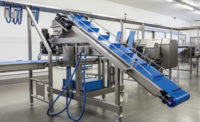Sustainability becomes mandatory for snack and bakery manufacturers
Bakeries, snack producers and supply-chain partners are taking strong steps toward minimizing their eco-footprints while still maximizing growth.


courtesy of Seven Sundays

courtesy of Quinn Snacks

courtesy of Pepperidge Farm, Inc.

courtesy of Pepperidge Farm, Inc.





Sustainability means different things to different people. For some, it’s all about minimizing emissions or reducing the carbon footprint. For others, it’s strengthening local economies and communities. Still others emphasize organic or natural ingredients. But whatever the definition, sustainability is no longer a “bonus” for any food manufacturer. It’s a mandate, and a mandate that’s coming directly from consumers.
According to Nielsen’s “Global Corporate Sustainability Report,” up-and-coming consumers—namely, Millennials and Generation Z—are the most willing to pay extra for goods they perceive to be sustainable; almost three-quarters of these respondents said so. But they’re not alone. About half of Baby Boomers also said they’d pay more for sustainable products, up 7 percentage points from the previous year.
The good news is that players in the snack and bakery industry are already taking steps to contribute to a cleaner and kinder market.
Green packaging: The Dow Chemical Co.
Why they’re sustainable: “We are dedicated to sustainability as a leading and engaged voice for policies and programs that advance the vision of a circular economy for plastics,” says Jeff Wooster, global sustainability director, Dow Chemical Co., Midland, MI.
What they do: Though plastic may not be seen as a traditionally green material, Dow is taking steps to change perception. According to Wooster, plastic can help minimize food waste by keeping products fresh and, since it’s so lightweight, it can help cut down on greenhouse gas emissions associated with transportation. Wooster points out that plastic also requires fewer production resources than glass and metal packaging, and has the capability to be recycled.
But Dow doesn’t stop there. In September 2016, the company helped to launch Hefty Energy Bag, a waste management program designed to convert non-recycled plastics into energy, fueling 6,000 homes in the Omaha area. Additionally, that same month, Dow committed to spending $2.8 million to drive solutions that address global marine debris and litter. By working with the Ocean Conservancy, they’re seeking to understand, quantify, and ultimately limit the plastic waste challenge.
Going local: Seven Sundays
Why they’re sustainable: “Sustainability is, in a lot of ways, the reason for our existence,” says Brady Barnstable, co-founder, Seven Sundays, Minneapolis. “In everything we do—from our suppliers to our customer interactions—we do it passionately, authentically, and with transparency and good intention. We dream big and look around us every day to see how we can make a positive impact on our community, our employees, and our customers. It is who we are as founders, so for us there really isn’t another way.”
What they do: At Seven Sundays—which manufactures a range of muesli products, including bars in Banana Toasted Pecan, Blueberry Lemon & Chia and Cocoa Pumpkin Seed—sustainability is all about a local focus. Its oats, buckwheat, flax, sunflower seeds and packaging all come from local Midwest suppliers, accounting for 50 percent of total output. But its commitment to local doesn’t end with what it gets; it also tries to give back locally whenever it can, whether that means volunteering or donating money to community pantries. Currently, Seven Sundays sponsors a local school and every Friday fills student backpacks with nourishing foods.
Eco-friendly transit: Ryder System, Inc.
Why they’re sustainable: “Business demand for cost and energy efficient technologies has increased interest in environmentally-sound transportation solutions, presenting future business opportunities for Ryder,” says Nanci Tellam, vice president for environmental, real estate, and fuel services, Ryder System, Miami. “Providing leading edge technologies to customers helps to provide business growth, implementing energy cost reduction programs results in savings, and offering preparedness services increases business demand.”
What they do: With more and more companies outsourcing their transit needs, Ryder is poised to offer eco-friendly initiatives. Transportation engineers optimize routes to minimize miles driven, and also tap into alternative fuels and improved tractor/trailer designs to further shrink the carbon footprint. Ryder further reduces emissions through its RydeSmart telematics program, designed to offer up to 15 percent reduced fuel consumption through improved routing, driving habits, and more. Off the road, virtually all its automotive waste streams are recycled, including oils, solvents and parts cleaners, batteries, tires, and scrap metal; in fact, 50 percent of its tires are retreads, each saving 15 gallons of oil and using 70 percent less energy to make than a new tire.
Green agriculture: Quinn Snacks
Why they’re sustainable: “This isn’t our planet; it’s on loan to us and we must do everything we can to preserve it,” says Kristy Lewis, CEO and founder, Quinn Snacks, Boulder, CO. “We are in this for one thing alone: to help push and change the food landscape with responsible, ethical and sustainable decisions.”
What they do: Sustainability quite literally starts from the ground up at Quinn Snacks, where the priority is sourcing organic ingredients when they can, in order to dedicate more land to sustainable and chemical-free agriculture, and supporting American agriculture rather than importing materials at a lower dollar cost—which can add up to a higher cost for the environment. Further, the company commits to giving its business to other green businesses: its sunflower oil supplier has completely zero-waste practices in place, for example, and it uses sorghum which is one of the most drought and water efficient crops available.
CO2 neutrality: Palsgaard
Why they’re sustainable: “Sustainability is an important part of our company profile,” says Lisa Drejer Mortensen, senior CSR specialist, Juelsminde, Denmark. “Our strong commitment to sustainability means an added value to our products and a stronger position within the food industry.”
What they do: In 2015, Palsgaard—recognized with Top Honors in the 2016 IBIE B.E.S.T. in Baking sustainability program—achieved the first part of its goal to achieve zero carbon footprint globally by 2020 when its Danish plant became completely CO2 neutral. Various initiatives came together to make this happen, from responsible supplier management, to reducing waste water and products, to sourcing 100 percent sustainable palm oil.
Print-free practices: FlexiBake Ltd.
Why they’re sustainable: “Being sustainable is extremely important to our business because we are, in many ways, responsible for the way our customers manufacture their products using the reports and processes in our ERP system,” says Nicole Carney, sales and marketing manager, FlexiBake, Vancouver, British Columbia.
What they do: FlexiBake is another Top Honors B.E.S.T. in Baking company. Its software is designed to help improve efficiency for customers and, in house, the company runs a completely print-free operation. It recycles all paper and cardboard and also composts. Further, by bringing FlexiBake to the cloud in 2013, users can now move their inventory counts from paper to the cloud, as well.
Eco-friendly fuel: ROUSH CleanTech
Why they’re sustainable: “The beauty of our sustainable solution is that it’s ‘no compromise,’” says Todd Mouw, vice president of sales and marketing, ROUSH CleanTech, Livonia, MI. “It benefits the bottom line for shareholders and, more importantly, benefits the environment and communities these companies service.”
What they do: ROUSH CleanTech designs, develops, manufactures, sells and services propane fuel systems for class 4-7 medium-duty trucks. Currently, many company vehicles run on alternative fuels, but leadership is working to provide additional solutions for snack and baking customers that reduce fuel costs, maintenance costs, and emissions, and also use a domestic energy source.
Green facilities: Pepperidge Farm, Inc.
Why they’re sustainable: “Reducing the resources we use and having an environmental management system in place help us to mitigate the impacts of climate change, better manage compliance, reduce costs, and increase efficiencies,” says Harry Pettit, manager, systems and infrastructure engineering, Pepperidge Farm, Norwalk, CT. “The risks of not doing these things can be detrimental to a manufacturing business and can impact profitability and reputation.”
What they do: Currently, Pepperidge Farm—recognized with 2016 B.E.S.T. in Baking Top Honors—is focusing its efforts on what it can implement in each facility, regardless of location or product type. Goals include reducing energy usage by 35 percent and sourcing 40 percent of electricity from renewable or alternative energy sources; recycling 95 percent of global waste; eliminating 100 million pounds of packaging from products; and deriving all packaging materials from sustainable sources.
What’s next?
Though significant strides are clearly underway, three areas will drive sustainability innovation in the future.
Wasted energy recovery: At Air Management Technologies, Inc., Lewisburg, PA, next-generation recycling will focus on taking the output from various waste streams (think ovens and refrigeration) and putting it to good use. The company’s Closed-Loop Waste Energy System can take these synergies and, through a closed system, reduce water, natural gas, and electrical costs.
Expanding current initiatives: Truly sustainable companies are taking their eco-initiatives and making them available for their customers and partners to compound impact. At FlexiBake, for example, 2017 holds a new app in store which will allow drivers to remove the paper involved in deliveries and invoicing.
Packaging waste: According to Barnstable, there still exists opportunities for snack and bakery manufacturers and packers to meet demands for recyclable flexible packaging. And with major retailers now expressing interest, it’s a big area to watch.
Looking for a reprint of this article?
From high-res PDFs to custom plaques, order your copy today!










